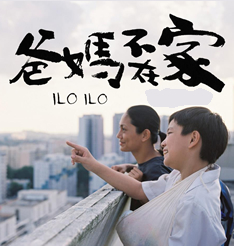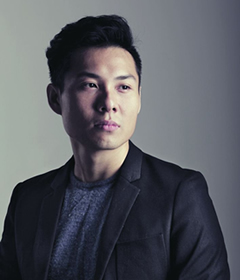| Interview with Anthony Chen, director of ILO ILO (爸媽不在家) |
|
 |
We recently had the pleasure of talking to director Anthony Chen about his Singapore set debut film Ilo Ilo, out in the UK on home entertainment this Bank Holiday Monday (25/08/14).
Anthony was born and raised in Singapore where his life was very similar to the premise of the film. Having attended film school he then came to the UK and created several short films, before working on Ilo Ilo. The film premiered and won the Camera D'or award at the Cannes Film Festival last year and has scooped another 26 wins world-wide since.
We would like to thank Anthony Chen for his time to do this interview and to also wish him all the best in the future. |
|
| 1. |
The film is based on your personal experiences as a child. How similar was your life growing up, in relation to that of Jiale's character in the film?
|
Well, obviously it is inspired by my experiences of growing up in the 90's in Singapore. Within Singapore it is very common for families to have a live-in maid to hire and Nanny. It is not unconventional like it is in Western societies, in Singapore it exists for many reasons. So for my family as well as many others we would actually hire someone from the Philippines or from Indonesia, or something like that to look after the kids because we are largely a middle-class country with a huge percentage of parents working, so you have got a lot of doing well with in income families.
So I would say that it was inspired by my childhood, but I would not say that I was not that naughty as the boy Jiale [haha] - I was more of a mature child, I was always avoiding trouble and I don't think I was that bad a child, I think that a lot of the emotion that you see in the film were really from real life. Some of the things that happen in the film were from real life, but in terms of the character Jiale I felt I needed to push in much further dramatically, in order for the character to really work.
|
| 2. |
What made you choose this as the topic for your first film, it seems like quite a tough choice for any film-maker? ... |
I don't think I chose the film, it felt like the film chose me. I went to film school twice, I went in Singapore and later on I came over to the UK, and went to the National Film and Television school for 2 years and did a Master’s degree in Directing. When I graduated from school here, I knew that it was time to start my first film, so I made a lot of shorts. By then I had made about eight small films already. I had no idea what film I wanted to make, but all this started, with all of these childhood memories coming back into my head, it was sort of like flooding my mind as I remembered them.
The Filipino woman, Teresa, in the film we all called her Auntie Terry, and I just remembered so many moments that we had of her, and I think what really was point where I felt that it should be the film that I should making is when I recalled the moment in the airport when she has been with us for eight-years and she decided that it is time for her to go home and I remember that I was 12, and I was crying, crying and crying at the Airport. It was the first time in my life that I had to deal with separation. It was so painful as a child and it made me question a lot of things at my childhood. That whole idea of 'how can a child be so attached to a stranger, to somebody else who is not from the bloodline' - who is not really a part of the family, who is just a servant - just there to take care of you. I knew that there was a film in there, so I just plunged right into it.
|
| 3. |
So It seems that Aunt Terry is very much a real person ... Have you seen her since your early childhood? |
Yeah, last year I met her. I had not seen her in 17 years after she left Singapore from when I was 12 at the time. What really happened was that the Filipino media found her again because somehow after she left a year later my family had moved and we change our phone number and address, so lost the contact. She did not have a phone either and my family did not keep her address. There was not a chance at all that we thought we would ever see her again, but last year (2013) after the film won a major prize in Cannes Film Festival, the Camera D'Or for Best Debut Feature, there was quite the big 'ooh-ha' in the Philippines because obviously their own media was thinking 'what is this small little Singapore film that was inspired by a real life Filipino nanny?' ...
So they found me on Facebook and wanted to find her. I thought they were just joking - but they were very serious. I gave them three pictures of me and my brothers whilst we were growing up with her and all were had. But it was really hard because I didn't really believe that they could find her because all we had was her first name, Teresa, we had long forgotten her last name and the only other clue that we had was that she was from the Philippine province 'Ilo Ilo' hence the title of the film. They went for it in their media and two weeks later I got an email saying that they found her. So in a way in a way I think that this film has got me lot of things; it has done really well, it sort of introduced me I think to bigger film audiences, to the film industry as well as got me a few awards. In a way it got me back connections from long ago as well.
|
| 4. |
In the film Koh Jia Ler played the role of Jiale, but it is reported that you looked at over 8000 different boys for the role and actually auditioned over a quarter of them. What was this lengthy process like, and how did you manage to single out Koh Jia Ler for the part? |
It was a very long process. It was about 10 months total and we went to over 20 primary schools in Singapore. We saw about 8000 students, of which about 2000 of them we formally auditions, and eventually 150 were selected for work shops that were conducted over 6-months on weekends. I was quite sure from the start that I didn't want to cast a child into this role of speech and drama and he is at school and all that.I wanted to capture a real naturalism and honestly that life actually brings you. In a way he was the only kid out of everyone who felt really special. In the back of my head I was thinking of the lead character in Francois Truffaut's 'The 400 Blows'. That was such an iconic character, and I was sort of looking for the Singapore version of it.
|
| 5. |
The film is set in the 1990's when this life-style all happened. The setting is one of the things that make the film achieve authenticity and seem like real life. Was it difficult to find the locations to film, as Singapore has developed massively over the past 17/18 years? |
It is really, really difficult. But we are a small country, we are five-million people, it is a very small place. To drive from one end of the country to the other side will take you like one-hour. That is how small we are. So it has developed a lot since the 1990's. It is very different now, all very cosmopolitan and lots concrete glass and steal designs making it look modern. It is very hard to actually find locations that feel like the 90's. So we had work very, very hard, and I was very adamant to look at the textures, the props, the colours and the things like that in a way a lot of it felt like it had to be how I remembered it. Just like my experiences of growing up. Right from the colour of the lip-stick, down the colour of the hair, the colours patterns of the curtains had to show. I think I drove the costume and production crew really crazy in the end - I drove them mad!
|
| 6. |
It must have brought back much nostalgia. What was the reception of the film like in Singapore; as many others would probably be able to relate to this same life-style? |
I was quite surprised that it was so well received, because the thing is with Singapore is it is not a very sophisticated audience in terms of cinema viewing. If you look at previous films from Singapore that have often popped up at Cannes before, many art house films. A lot of them do not do well in Singapore at all, they might do a box-office of like 20,000 SGD. Not many people actually go and see the films, so in a way the word Cannes has been a blessing, and winning the Camera D'or is by far the fastest way to get audiences to see that film. I was really worried that people would receive the film in a good way, but I am quite surprised as the film did really well.
Of course I think that because of the prize in Cannes it was the first time that a feature film from Singapore has work a prize in Cannes, and no less a big prize. I think that helped to keep a lot of interested. You know eventually, the film was the highest grossing film of Singapore last year, and it played for 18 weeks - making it the longest running film ever of the year in Singapore. So it did really well, and I am thankful for it. I am hoping that the will also change the audience perception for other young Singapore film-makers who are coming out making their first films, so that people will go in with an open heart.
|
| 7. |
Having got a well-deserved standing ovation at Cannes Film Festival last year, and another twenty-six awards world-wide, at which point was it that you realized that you had something special? |
I wasn't sure at all, the only definite moment that I knew was really at the world premiere in Cannes. We had the most brilliant and the most disastrous ever I think. I did not expect it to go that way. The film stopped three times from the storms and power-failures and lots of black-outs - so it wasn't like the machines were failing or anything. But it was a power shutdown. But it was the fact that the film did not stop once, but three times. The first time 10 minutes, the second time 5 minutes and then 3 minutes - It was horrible and I was literally peeing my pants! I was so afraid, as I know from going to Cannes with my short films before, so I know how critical and demanding the audience is. So I was thinking that people would walk out on us. I was just praying and praying and praying they didn't.
But I was so glad that everybody had stayed right to the very end of the film.
I was so moved, it was quite electrifying to have a 15 minute standing ovation, because at the start I was thinking that all of these nice French people were probably taking pity on us because of this huge disaster that we had. But I could see in their eyes that they were genuine tears and that people were moved. That was the moment that I knew that there was something going for the film because I have even thought that when I was copying the film and making the post-production parts that the film was probably very culturally specific and that you will probably need some form of context, in terms of understanding Singapore, or at least this idea of hiring foreign maids before you get a sense of it. But I was quite amazing by how universal the film is eventually.
|

Anthony Chen with the lead cast holding the Camera D'or Award last year, 2013.
| 8. |
Wow! Are there any up and coming projects that you are working on in the near future that you can reveal? |
There are a few projects that I am developing right now in London with British producers. I cannot say exactly what just yet. I am also writing another as well that is to be again set in Singapore, because it was of course where I grew up and it is very much home. So there are a few things that are in the works of the pipeline. It is very likely that my net film will be made here, it will be my first English language film and I am very much looking forwards to making my next film. I am little bit restless now as I am not sort of actively making something.
|
| 9. |
Finally, is there any advice or tips that you would give to any young aspiring film-makers to follow in your success?
|
I think it is very important to have genuine passion. Film-making is just so hard, and the only way that you can pull yourself through it and to build a career from it is to really love films, you really need to love cinema, and that is important. Of course the next big advice I would say is to have ideas. It is about being honest with yourself, being the kind of character that you would like to be and films that you want to make, because I think that audiences can tell when it genuine, when the emotion and notice what you are trying to do and to say really becomes from an honest way.
|
| |
Thank you very much for your time, it has been a pleasure.
|
Great, thank you very much too...
|
 |
_____________________________
Anthony Chen - Director
_____________________________
|
|
|
| Interview Written On: |
| 22 August, 2014 16:00 PM |
| Page Last Updated: |
 December 27, 2014 3:32 PM
December 27, 2014 3:32 PM |
|